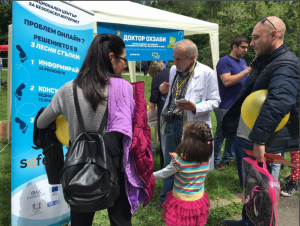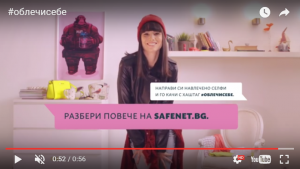 Speaking at a recent network meeting in London, Petar Kanchev outlined that the results from their recent research informed the decision of the Applied Research and Communication Fund to choose as key impact priority areas working towards curriculum changes and the introduction of training programmes, assisting parental involvement, and producing online educational content. The study was conducted in September 2016 in cooperation with MarketLinks agency and involved a national representative survey examining how children and young people engage with the internet and digital technologies. The results demonstrated the need to work on improving children’s digital and media literacy and their safe and ethical conduct online.
Speaking at a recent network meeting in London, Petar Kanchev outlined that the results from their recent research informed the decision of the Applied Research and Communication Fund to choose as key impact priority areas working towards curriculum changes and the introduction of training programmes, assisting parental involvement, and producing online educational content. The study was conducted in September 2016 in cooperation with MarketLinks agency and involved a national representative survey examining how children and young people engage with the internet and digital technologies. The results demonstrated the need to work on improving children’s digital and media literacy and their safe and ethical conduct online.
Based on the findings, the team identified several priority areas for working with stakeholders:
- Introducing digital literacy education to all stages of education process: the increasing share of pre-school children using the internet suggests the need to build and enhance their digital and media literacy as early as possible. It is essential to introduce elements of early digital literacy training with an enhanced focus on online safety even in preschools. About 42% of Bulgarian children reported that internet safety is not addressed enough in their ICT classes (Hajdinjak, 2017). Increasing the frequency and comprehensiveness of safety training in schools would counter these issues and help students avoid online risks.
- Targeted programmes for children aged 12 to 14 years: the survey showed that this group of children experience a higher risk of harm due to two coinciding factors: they start exploring and experimenting more with the internet while parental mediation and supervision decreases. Therefore, this group need special attention in the form of training, awareness-raising and information campaigns tailored to their needs and interests, and communicated in way and language they can easily relate with.
- More peer-to-peer training programmes: some of the most widespread risks connected to the use of digital technologies are associated with the online conduct of children and young people themselves (e.g. online bullying, sexting, sharing of illegal or inappropriate content). The practice has shown that peer mediation is an effective approach to teaching children how to use digital technologies safely and responsibly. For the training of young trainers, SafeNet seeks to collaborate with NGOs, schools, state institutions and corporate actors to achieve best and lasting results.
- Promoting and assisting parental involvement and mediation: Bulgarian children demonstrate rather passive attitudes in constructive online interaction, collaboration, and civic participation. It is important to help and empower parents to assist their children in gaining digital and media literacy skills, to offer support and mediate their children’s internet use.
- Collaborating on the production of positive online content: Bulgarian children are not particularly active in online content creation, collaboration, and civic participation. Large-scale collaborative efforts between policy-makers and industries for the creation of positive online content can be helpful for facilitating a better online environment for children. Such efforts could also target small and medium-sized ICT businesses by stimulating them to create effective online solutions for children directed towards interactive content that promotes digital collaboration and content creation among children.
The impact strategy and actions
SafeNet used a range of strategies to reach different stakeholders and increase the use of the research outputs with a main focus on improving digital and media literacy.
- The organisation has a portfolio of literacy and risk awareness activities for children and families organised independently or in collaboration with other stakeholders, such as government agencies, educators, NGOs, industry.
- The team also works with educators and has an established partnership with key figures (head teachers, teachers, school psychologists, pedagogic counsellors) in about 180 schools around Bulgaria and also maintains a website targeted at teachers and parents.
- In collaboration with the Sofia University, SafeNet has developed a programme for teacher training and curriculum development. It uses Montessori pedagogy for teaching digital literacy to primary school students.
- SafeNet has built a strategic partnership with other stakeholders interested in collaborating on media and digital literacy.
- SafeNet has also successfully used the hot topic of the day, such as media interest in the fake news about The Blue Whale game, to talk about the results from the study and organize a campaign with media partners to promote digital literacy.
Further materials
Working on knowledge exchange and impact
Recognising online hurtful behaviour among peers
More about the Bulgarian Safer Internet Centre
Post authors: Mariya Stoilova and Petar Kanchev









